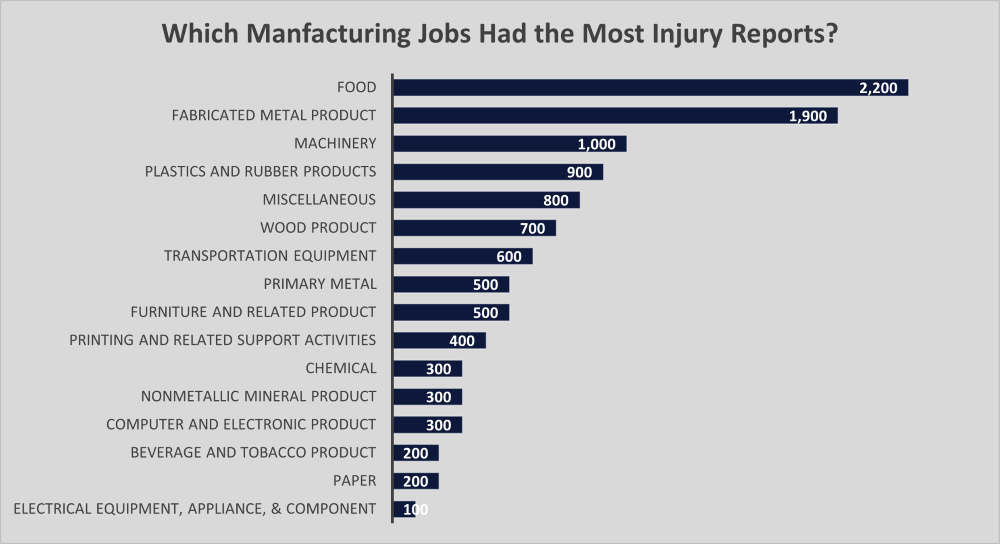When you wake up every morning and go to work, you want to feel like you’re heading to a safe environment. Unfortunately, we know that isn’t always the case, and that many injuries, illnesses, and even deaths can occur at work.
A data analysis by Minnesota workers’ comp attorneys Kemmitt, Sanford & Kramer examined workplace injuries in various industries. In general, data from 2013-2017 shows that nearly one in three workplace injuries in Minnesota involves driving a vehicle. However looking more closely at one specific industry – manufacturing – we see a variety of causes for the many nonfatal and fatal occupational injuries that occur.
Injuries By Manufacturing Job (Minnesota, 2020)

Within the specific manufacturing industries, food manufacturing was the one with the most nonfatal injury reports (2,200). Food manufacturing is an industry that provides Minnesotans with a lot of jobs, but that doesn’t mean the industry has no risks. Let’s take a look at some of the occupational injuries and illnesses that are commonly reported in manufacturing.
Respiratory Issues
One of the biggest dangers in manufacturing is to the lungs. Respiratory issues can develop after inhaling irritants or toxic chemicals such as asbestos or crystalline silica. In 2020, there were around 700 reports of respiratory injuries among manufacturing employees.
Within the food manufacturing industry, there is a flavoring agent used called diacetyl that can cause a deadly form of bronchitis when inhaled (but not when ingested). Other manufacturing jobs with risks of lung diseases include textile and metal manufacturing, which can both involve the inhalation of dangerous particles.
Hearing Loss
Another major risk in manufacturing is hearing loss and tinnitus. The machines used in manufacturing jobs can be extremely loud, and additionally, exposure to a certain type of chemical can cause hearing loss. Chemicals that affect hearing are referred to as ototoxic chemicals.
Unfortunately, studies have found that noise-exposed workers often don’t use hearing protection. Among 2020 Minnesota workers’ comp cases, around 400 reported hearing loss. Not only this, but many more workers than that have suffered hearing loss; they just haven’t become hearing impaired enough to qualify for a workers’ comp case (yet).
Hundreds more of workers’ compensation cases in Minnesota were categorized as “other.” These “other” injuries in the manufacturing industry often include amputation or bodily injury from falling or from repetitive motion.
Manufacturing Fatalities
In 2020 there were 7 reported fatalities in the manufacturing industry in Minnesota.
Two of those fatality reports listed the cause of death as transportation incidents, and three listed falls, slips, or trips. The specific manufacturing occupations that had fatalities were food manufacturing (4 deaths) and nonmetallic mineral product manufacturing (1 death). At least one food manufacturing fatality happened at a poultry slaughtering and processing job.
Safety Tips for Manufacturing Employees
Despite the inherent dangers that come with a manufacturing job, there are steps that employees can take to try and protect themselves from injury and illness.
- Wear ear protection. It is recommended that industrial noise protectors be worn, such as ear plugs and/or earmuffs.
- Wear a face mask. Since there are plenty of dangerous particles that can be inhaled, it only makes sense to wear a form of protection between your mouth/nose and those irritants.
- Always follow protocol. Plenty of injuries occur because of human error because someone rushed through a checklist or didn’t follow standard operating procedure.
- Wear a seatbelt and drive safely. There are many motor vehicle injuries reported in a variety of workers’ comp cases, so make sure to stay safe behind the wheel.
Overall it is our employers’ job to ensure a safe work environment, but unfortunately accidents happen. Because of the hazards of the job, manufacturing employees should pay extra special care to their safety when at work.




No Comment